Mubarak Staying
While earlier in the day the indications were that Mubarak was on his way out, Mubarak himself had different plans it would seem. The question becomes: now what?
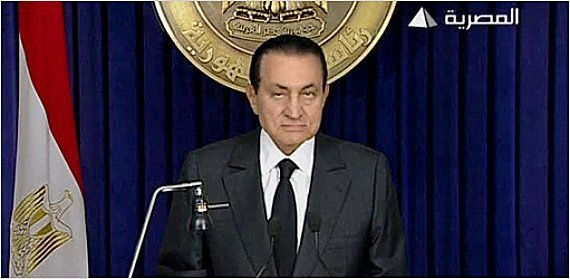 While the rumors earlier in the day, as well as a statement from the military, seemed to indicate that Egyptian President Hosni Mubarak was prepared to acquiesce to the main demand of the protesters and step down.
While the rumors earlier in the day, as well as a statement from the military, seemed to indicate that Egyptian President Hosni Mubarak was prepared to acquiesce to the main demand of the protesters and step down.
However, he only announced a vague transfer of some powers to the Vice President and otherwise reiterated that he was staying until September.
Via CNN: Egypt unrest: Protesters erupt in anger after Mubarak signals he will not resign.
The crowd in Tahrir Square had gathered to hear what they thought was going to be a resignation speech, but instead that heard just the opposite. The real question now is what the protesters will do tomorrow. I heard some of the participants interviewed on the BBC calling for a march on the presidential palace tomorrow. The degree to which this is a widely held sentiment is unclear. What is clear is that there is widespread anger and disappointment on the streets of Egypt at the moment.
One of the elements of Mubarak’s speech that I found amusing/underscores the fig leaf of legitimacy that he is hiding behind:
Mubarak said he has delegated powers to the vice president “in accordance with the constitution.”
Given that Mubarak only saw fit to name a vice president (a constitutional office) as a result of the protests (after failing to do so for three decades) makes appeals to doing things “in accordance with the constitution” vis-a-vis said VP hardly makes one think that Mubarak’s main concerns are appropriate institutional procedures.
As has been the case from the beginning, this issue is likely to be settled by the disposition of the military. To date the armed forces have been able to avoid making a definitive more for the regime or against the populace. The test is going to be if the protests move to another level and the military is forced to make a choice. If the protests moves to the presidential palace, such a choice my have to be made.
See also Mubarak Refuses To Step Down, Crowds In Cairo Furious from Doug Mataconis

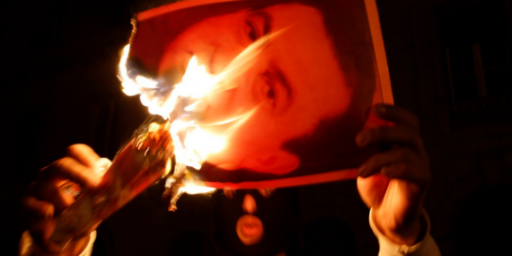
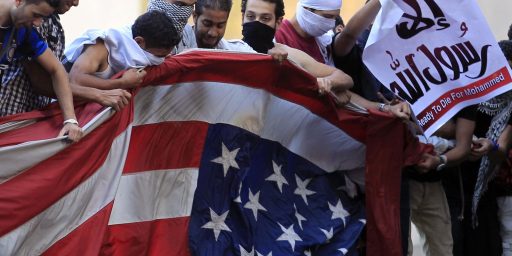

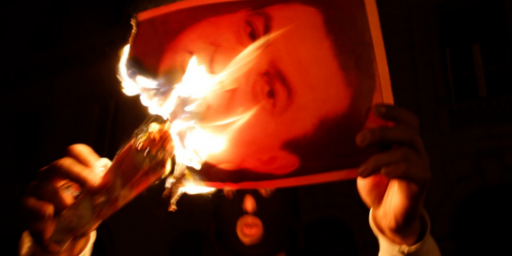
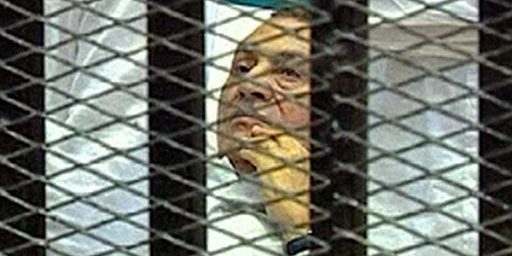
It seems likely his flat refusal to leave means he has already reached some sort of accomodation with the military. The protesters aren’t going home. They’re too heavily invested, have sacrificed too much to back down now. I think this will get ugly fast.
Political power grows out of the barrel of a gun. The Egyptian military has the guns; Mubarak apparently continues to enjoy the confidence of the military.
So, as I implied a week ago, for Mubarak to leave the military must fracture. The military will start fighting amongst its factions, it will fight amongst its factions and against the demonstrators, or Mubarak will stay.
So much for academic discussions of what would follow Mubarak.
Never underestimate the narcissism of an 80 year-old dictator. It was the speech of a deluded old man who actually thinks he’s been not only protecting but defining his country, while he looted and imprisoned and tortured. Like a tapeworm imagining itself loved by its host.
@Dave:
It doesn’t take a fractured military but could also take a unified military command who decides, for any number of reasons, that enough is enough.
@Michael:
I don’t think this is over with yet. But indeed in regards to the narcissism in question.
Thing is, the U.S. likely has more influence over the Egyptian High command than Mubarak. What comes next will probably have the White House seal of approval stamped on its forehead. There has been a tendency to dismiss the degree of American leverage over the current situation, and in the political sphere that is true. Our two militaries have a tighter relationship, and I’ll guarantee you the Obama Administration is pulling every string it has to keep the High Command from turning against the protesters.
Three guesses who the Egyptian people blame if the American equipped and trained Egyptian Army crushes the crowd in Tahrir Square.